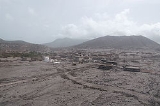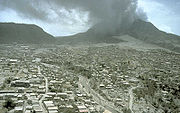
Plymouth, Montserrat
Encyclopedia
Plymouth is the de jure
capital of the island of Montserrat
, an overseas territory of the United Kingdom
located in the Leeward Island chain of the Lesser Antilles
, West Indies. The town was overwhelmed by volcanic eruptions starting in the 1990s and was abandoned. For centuries it had been the only port of entry to the island.
fell on Plymouth and in December residents were evacuated as a precaution. They were allowed back a few months later but on 25 June 1997 a massive eruption produced pyroclastic surge
s that killed 19 people and reached nearly to the island's airport. Plymouth was again evacuated. Between 4–8 August a further series of eruptions destroyed approximately 80% of the city, burying it under 1.4 metres (4.6 ft) of ash. This hot material burned many of the buildings, making inhabitation nearly impossible for a sizable portion of the residents.The pyroclastic flows, lava, ash and other volcanic rock types were in general compact and had a density similar to that of concrete. The removal of the overburden would have required the use of explosives, bulldozers and other resources too expensive for widespread use. Furthermore, it was anticipated that the rock underneath the hardened mud and lava would have been scorched and left completely non-arable by the heat of the pyroclastic flows. Plymouth was abandoned and the southern half of the island was declared an exclusion zone because of the continued activity at the Soufrière Hills. The government of the island was moved to Brades, although Plymouth remains the de jure
capital.
 The destruction of Plymouth caused severe problems for Montserrat. It had been the largest settlement on the island, with around 4,000 inhabitants and it had been the site of most of the island's shops and services, in addition to having been its seat of government. Some of the lost facilities have been re-created elsewhere on Montserrat. This has not forestalled emigration. More than two-thirds of the island's population was evacuated overseas and most of the people have not returned.
The destruction of Plymouth caused severe problems for Montserrat. It had been the largest settlement on the island, with around 4,000 inhabitants and it had been the site of most of the island's shops and services, in addition to having been its seat of government. Some of the lost facilities have been re-created elsewhere on Montserrat. This has not forestalled emigration. More than two-thirds of the island's population was evacuated overseas and most of the people have not returned.
De jure
De jure is an expression that means "concerning law", as contrasted with de facto, which means "concerning fact".De jure = 'Legally', De facto = 'In fact'....
capital of the island of Montserrat
Montserrat
Montserrat is a British overseas territory located in the Leeward Islands, part of the chain of islands called the Lesser Antilles in the West Indies. This island measures approximately long and wide, giving of coastline...
, an overseas territory of the United Kingdom
United Kingdom
The United Kingdom of Great Britain and Northern IrelandIn the United Kingdom and Dependencies, other languages have been officially recognised as legitimate autochthonous languages under the European Charter for Regional or Minority Languages...
located in the Leeward Island chain of the Lesser Antilles
Lesser Antilles
The Lesser Antilles are a long, partly volcanic island arc in the Western Hemisphere. Most of its islands form the eastern boundary of the Caribbean Sea with the Atlantic Ocean, with the remainder located in the southern Caribbean just north of South America...
, West Indies. The town was overwhelmed by volcanic eruptions starting in the 1990s and was abandoned. For centuries it had been the only port of entry to the island.
Volcano and abandonment
Beginning in July 1995, a series of huge eruptions at the Soufrière Hills volcano sent lava flows and ash falls across a wide area of southern Montserrat, including Plymouth. It was immediately clear that the city was in danger; on 21 August 1995, tephraTephra
200px|thumb|right|Tephra horizons in south-central [[Iceland]]. The thick and light coloured layer at center of the photo is [[rhyolitic]] tephra from [[Hekla]]....
fell on Plymouth and in December residents were evacuated as a precaution. They were allowed back a few months later but on 25 June 1997 a massive eruption produced pyroclastic surge
Pyroclastic surge
A pyroclastic surge is a fluidized mass of turbulent gas and rock fragments which is ejected during some volcanic eruptions. It is similar to a pyroclastic flow but it has a lower density or contains a much higher proportion of gas to rock ratio, which makes it more turbulent and allows it to rise...
s that killed 19 people and reached nearly to the island's airport. Plymouth was again evacuated. Between 4–8 August a further series of eruptions destroyed approximately 80% of the city, burying it under 1.4 metres (4.6 ft) of ash. This hot material burned many of the buildings, making inhabitation nearly impossible for a sizable portion of the residents.The pyroclastic flows, lava, ash and other volcanic rock types were in general compact and had a density similar to that of concrete. The removal of the overburden would have required the use of explosives, bulldozers and other resources too expensive for widespread use. Furthermore, it was anticipated that the rock underneath the hardened mud and lava would have been scorched and left completely non-arable by the heat of the pyroclastic flows. Plymouth was abandoned and the southern half of the island was declared an exclusion zone because of the continued activity at the Soufrière Hills. The government of the island was moved to Brades, although Plymouth remains the de jure
De jure
De jure is an expression that means "concerning law", as contrasted with de facto, which means "concerning fact".De jure = 'Legally', De facto = 'In fact'....
capital.


